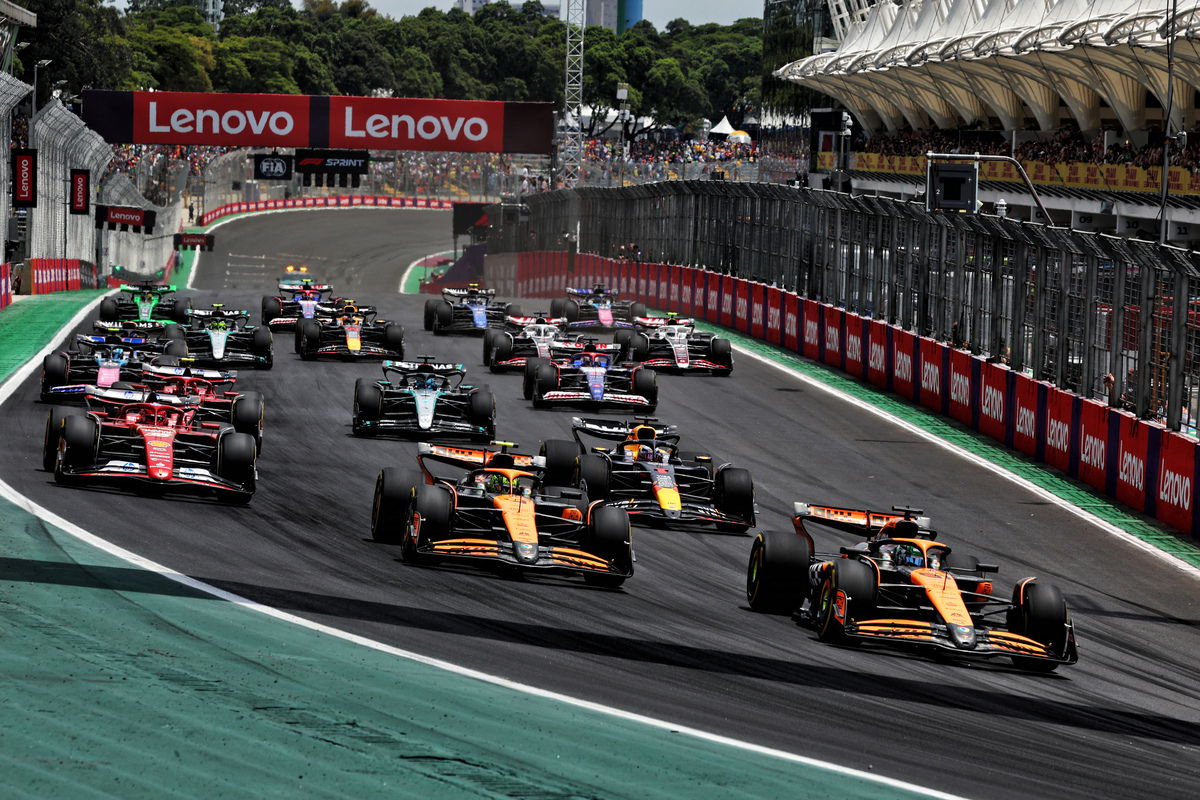

A quarter of current F1 race promotion contracts are poised to expire following next year’s events.
That includes the Chinese, Mexico City, and Las Vegas Grands Prix, and five within Europe.
It is expected that Las Vegas will continue, with longer term deals in place surrounding the event, which is promoted by Formula 1 itself.
Promoters in Mexico City have also expressed a desire to secure a new deal despite the uncertainty that surrounds home-favourite Sergio Perez.
The future of the the Chinese Grand Prix is less clear given Sauber last week confirmed it will part ways with Zhou Guanyu at the end of the season, though that event has run since 2004 (aside from the recent four-year COVID-induced absence).
However, it is the five events in Europe that arguably offer greater possibilities for Domenicali.
The Emilia Romagna, Monaco, Belgian, Dutch, and Italian Grands Prix are all up for renewal. The Spanish Grand Prix will disappear from 2026 in favour of Madrid.
Formula 1 is currently at capacity in terms of race events.
Though 25 are technically allowed under the terms of the Concorde Agreements, it requires unanimous support for any more than 24.
That is unlikely given the additional strain it would place on organisations that are already creaking under the pressure of near-constant global travel.
The 24-event limit is a difficult one for Formula 1 and Liberty Media as it essentially places a cap on the ability to scale the championship and therefore its own finances.
Without the ability to simply add more events, the focus is therefore on squeezing more out of promoters – be that new or existing.
Hence, with eight events out of contract next season, five of them in Europe, it’s likely there will be some jostling of the calendar as the sport’s commercial rights holder looks to increase its revenue.
Domenicali has spoken several times of strong interest from new venues, with Thailand and more latterly Rwanda emerging as strong candidates.
Without space on the calendar to simply add them, an existing event would have to make way.
There has long been pressure on organisers in Italy for both the Emilia Romagna and Italian Grands Prix, the former understood to have one of the lowest fees on the calendar (the former’s thought to be second only to Monaco).
Similar concerns surround the Belgian Grand Prix, which is on par with Imola as far as hosting fees go.
Monaco is also thought to no longer be the sacred cow it once was, with patience having long worn thin on the poor, cramped facilities and lacklustre racing.
However, there is still interest in F1 racing in those markets and, as such, it has long been said that F1 will begin rotating events, allowing for a region to enjoy the benefits of an event without the significant annual costs associated.
That was reaffirmed last week by Domenicali when speaking on a Liberty Media investor call.
“We have some news to share very, very soon with regard to the possibility in the mid-term to have some rotational European Grand Prix and some other new options coming later,” Domenicali confirmed.
“This is something that, of course, we will clarify in the due course.
“It is true that we have a large demand of new possible venues that want to come in and our choice will always be balanced between the right economical benefits that we can have as a system and also to leverage in the growth on the market that we can see potential that will be beneficial for us to grow even further our business.”
Organisers in The Netherlands have stated that they’re open to rotating the event.
Doing so, perhaps with the Belgian Grand Prix, would free up one place on the calendar, allowing the admission of Thailand or Rwanda.
Formula 1 has long held ambitions to return to Africa, having not raced on the continent since 1993.
Multiple efforts have been made to bring F1 back to Kyalami, the most recent collapsing last year.
Since then, Rwanda has controversially emerged as the front runner.
The country will later this year host the FIA gala, the first time the event has been held in Africa.
Three decades on from the civil war and resulting genocide that decimated its population and economy, Rwanda remains one of the poorest countries in the world.
It boasts a population of around 14 million, an estimated 40 percent live below the poverty line, and more than half on less than $1.90 per day. More than three-quarters of its labour force work in agriculture.
The country continues to receive significant foreign aid, totalling $1.3 billion in 2021 alone.
To secure a place on the F1 calendar, it’s expected a promoter would have to spend in the region of $50 million annually in hosting fees, not accounting for costs associated with track build, staffing, etc.
Those involved in the Rwandan GP project have insisted that the event is part of a broader strategy to help grow the country’s economy and raise its international profile – consistent with president Paul Kagame’s desire to turn Rwanda into the Singapore of Africa.
But it has also attracted criticisms of sportswashing amid allegations of corruption and humans rights issues, similar concerns to those raised in a number of other countries Formula 1 already visits.
Speaking with Motorsport Network in August, Domenicali insisted the project is serious.
“They have presented a good plan,” he confirmed.
“It will be in a permanent track.
“We want to go to Africa, but we need to have the right investment and the right strategic plan.
“We need to have the right moment, and we need to make sure that also in that country, in that region, in that continent, there is the right welcoming, because, of course, they have other priorities.”
Speaking last week, Domenicali again noted interest from new promoters and the pressure that places on the calendar.
“I do believe that all the propositions that are coming on our table is just giving us the possibility to make even better choices for our future,” he opined.
“So as always, we need to be balanced, knowing that we cannot follow only the pure direct financial proposition, because that is different from region to region, but it’s up to us to propose to our stakeholders the right choice.
“I think that we are in a good momentum to make sure that the strategy for the future is even stronger, and that’s why we are so confident about the fact that this will help to enhance our platform on the sport, on social and business perspective.”
On top of introducing rotational events to open the door for a new grand prix, it’s also expected that some races could be moved from their traditional dates; the Canadian Grand Prix in June is awkward in light of the start of the European season, and Miami in May.
It’s also anticipated that the calendar will feature greater regionalisation to streamline travel and logistics.
F1 race promotion contracts
| Event | Venue | Contract |
| Belgium | Spa-Francorchamps | 2025 |
| China | Shanghai International Circuit | 2025 |
| Emilia Romagna | Imola Circuit | 2025 |
| Italy | Monza | 2025 |
| Las Vegas | Las Vegas Strip Circuit | 2025 |
| Mexico City | Autodromo Hermanos Rodriguez | 2025 |
| Monaco | Monaco | 2025 |
| Netherlands | Zandvoort | 2025 |
| Azerbaijan | Baku City Circuit | 2026 |
| Spain | Circuit de Barcelona-Catalunya | 2026 |
| USA | Circuit of The Americas | 2026 |
| Austria | Red Bull Ring | 2027 |
| Saudi Arabia | Jeddah Corniche Circuit | 2027 |
| Singapore | Marina Bay Street Circuit | 2028 |
| Japan | Suzuka | 2029 |
| Abu Dhabi | Yas Marina Circuit | 2030 |
| Sao Paulo | Interlagos | 2030 |
| Canada | Circuit Gilles Villeneuve | 2031 |
| Miami | Miami International Autodrome | 2031 |
| Hungary | Hungaroring | 2032 |
| Qatar | Lusail Intermational Circuit | 2032 |
| United Kingdom | Silverstone | 2034 |
| Bahrain | Bahrain International Circuit | 2036 |
| Australia | Albert Park | 2037 |





















Discussion about this post